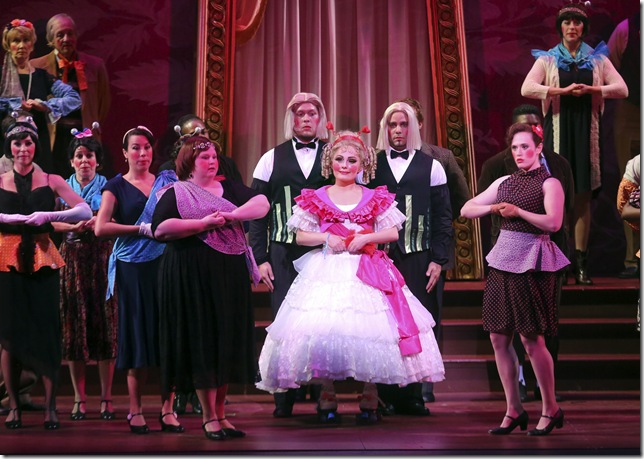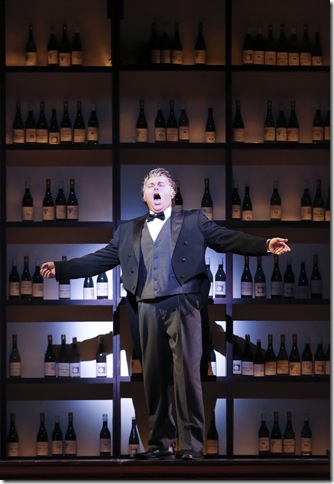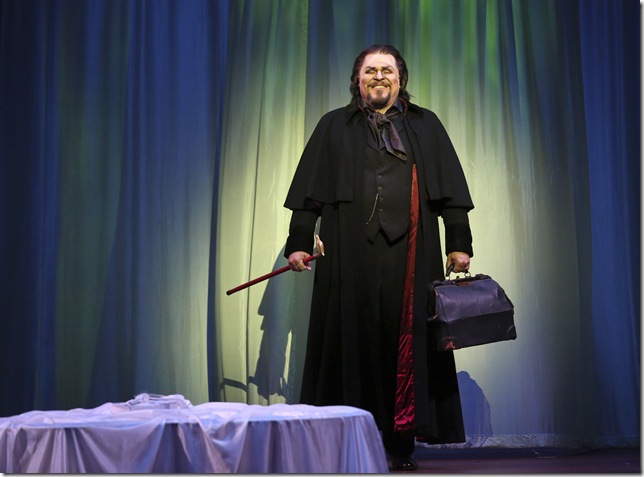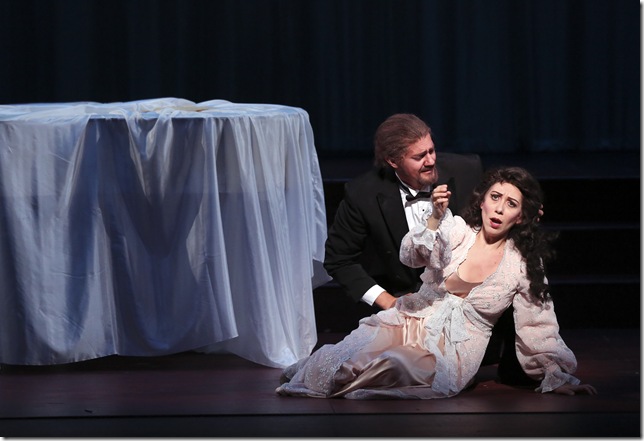Opera’s long history means that today’s audiences are treated to entertainment conventions from several different eras, and when it gets into pre-Industrial Revolution territory, viewers generally have to make something of a leap to get to full enjoyment.
But Les Contes d’Hoffmann (The Tales of Hoffmann) was composed by Jacques Offenbach for a late 19th-century urban bourgeoisie that in many ways shared our basic cultural orientation, if considered broadly: A society directed by marketplace concerns rather than the old pillars of church and homeland, and that makes its art easier to understand.
That’s one thing that explains the genial reception given last weekend to the Palm Beach Opera’s season-closing production of Offenbach’s final, incomplete stage work. The most important reason for its popularity March 23, thought, was that it was a well-sung, well-acted production that knew how to keep its audience amused and entertained.
It also had a deep bench of good singers. In addition to the much-admired bass-baritone Mark Delavan, who played the four villains, and three fine sopranos in the roles of the women, this production also brought back a familiar Palm Beach Opera face from seasons past in the person of mezzo Irene Roberts, whose work as the Muse unified and distinguished this production.
Presented in more-or-less 1920s style in its opening cabaret sequence, the production rented from the Virginia Opera and staged by Chautauqua Opera’s Jay Lesenger had a busy, imaginative look for its four scenes. There were plenty of things to look at in the busy sets, and there was good, broad comedy when necessary in the person of tenor Matthew DiBattista, who sang the four servants.
The Hoffmann was Christopher Bengochea, an American tenor who last appeared here five years ago in the second cast of Puccini’s La Bohème. The original Hoffmann, Italian tenor Giuseppe Filianoti, left during rehearsals after the company said he was unable to provide the required services. Bengochea made a good Hoffmann, with a strong, clear voice and a penetrating top that helped lend his character earnestness and passion. His acting was decent, and he blended well with soprano Eleni Calenos in the Act II duet (C’est un chanson d’amour).
As the villains, Delavan was suitably menacing, portraying his parts like a professional master criminal rather than Snidely Whiplash, which was good for the drama, but perhaps a little cool for the green spot that illuminated his head whenever he revealed himself to be, once again, Lindorf. Offenbach’s music doesn’t require the heft of Wotan, the role for which Delavan has recently been celebrated, but he got to show the roundness of his big, powerful voice in a Scintille, diamant that won generous applause Sunday afternoon.
Roberts, who sang with the Young Artists program not long ago and appeared as a fine Suzuki in Madama Butterfly in 2011 before moving on to one of the Flower Maidens in the Metropolitan Opera’s 2013 production of Parsifal, was an ideal Muse. In all of her appearances, she dominated whatever the action was at the time, and she did so with a large, rich, youthful voice that impressed as one with plenty of reserves to spare. Her acting was good, too, though it’s too bad she didn’t have more to do: Her impression of Olympia’s automaton movements almost brought down the house, brief though the bit was.
As Olympia, the Maine-born soprano Ashley Emerson was charming in her Les oiseaux dans la charmille, doing a nice job with her coloratura acrobatics and singing with a highly focused, light-colored sound. Lesenger put her in roller skates for the part, something he’s done before, and it added a smart comic element, particularly at the end of Act I, when Olympia is dismembered offstage. Chorus members walk on with arms and legs, and then just before curtain, the empty roller skates slide on in a spotlight; the audience Sunday loved it.
Greek soprano Eleni Calenos, as Antonia, has arguably the best, deepest music to sing, especially Elle a fui, la tourterelle, a classic example of late 19th-century French parlor song. Calenos brought to the task a dark, lovely voice that is well-suited for romantic lyric roles. Her duet with Bengochea was big and beautiful, and it would be a pleasure to hear her in something more substantial in the future.
Palm Beach County’s own Keri Alkema, as the courtesan Giulietta, has the kind of large, weighty instrument that makes her a good choice for the Verdi and Rossini dramatic roles she’s been singing lately. She tended to oversing a little in her first moments, but settled in soon and delivered a strong, attractive performance. It’d be good to see her back in one of the major Verdi roles at this house, too.
As noted earlier, Matthew DiBattista was excellent as the four servants, with a tenor of impressive presence and a delightful gift for comedic acting, particularly as the deaf Frantz in Act II and the scheming Pitichinaccio in Act III. Young Artist Nicholas Nestorak was a very good Spalanzani in Act I and a fine Nathanaël in the Prologue, when his memorable tenor made a good counterweight to the men’s chorus and Hoffmann’s Kleinzach aria.
Two other Young Artists, baritone Tobias Greenhalgh as Hermann and Schlemil, and bass-baritone Peter Tomaszewski as Luther and Crespel, were just fine in these small roles, as was soprano Bridgette Gan in her brief appearance as La Stella.
The company chorus was quite weak in the opening Glou, glou, glou, and the men were somewhat less than engaged in the Prologue, when they’re supposed to be enthusiastic auditors of Hoffmann’s stories, rather than a large, respectful support group. The chorus got better as the opera proceeded, particularly when they needed to in the Barcarolle in Act III, which was very pretty, and drew sighs of recognition from Sunday’s audience.
Christian Knapp, an American conductor doing a lot of work these days in Russia, led the Palm Beach Opera Orchestra with a firm and judicious hand, and supported his singers admirably. Lesenger’s staging, also as mentioned earlier, was inventive and a pleasure to watch, but also quite conservative; also, its busy aspect often had the side effect of pushing Hoffmann somewhat to the margins. It could have used some more clarity on that point so that audiences would grasp the centrality of his unluckiness as well as the choice he’s left with at the end.
Julie Duro’s lighting was effective, especially in Act III, but the supertitles, credited to Allison Voth, were oddly stiff and old-fashioned, particularly after last month’s Barber of Seville, whose titles were as brash as today’s texts.
Palm Beach Opera’s 2014-15 season opens Dec. 13 with a free waterfront concert at the Meyer Amphitheater in downtown West Palm Beach, followed by Puccini’s La Bohème from Jan. 16-18, 2015, with Sabina Cvilak and Dimitri Pittas. A world premiere follows Feb. 20-22 with American composer Ben Moore’s Enemies: A Love Story, starring Daniel Okulitch, Leann Sandel-Pantaleo, Caitlin Lynch and Danielle Pastin. The season closes with Donizetti’s La Fille du Régiment from March 20-22, with Erin Morley and Taylor Stayton. Tickets go on sale Sept. 27. Call 561-833-7888 for more information, or visit www.pbopera.org.



